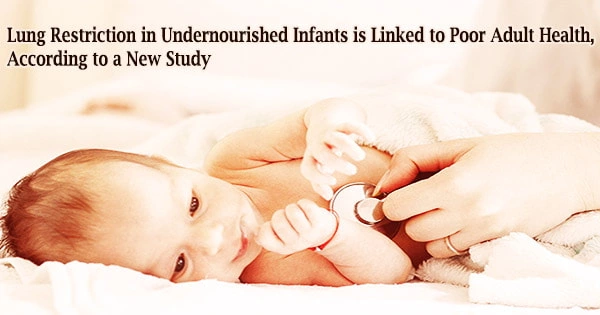According to an international study lead by experts at the University of Arizona Health Sciences, infants and children with inadequate nutrition and growth are more likely to develop a significant respiratory illness associated to comorbidities and early mortality as adults.
The research, which was published in The Lancet Respiratory Medicine, is the first to uncover early-life risk factors for adult-onset spirometric limitation.
Three risk factors were found to be significantly linked to adult spirometric restriction: maternal nutritional problems during pregnancy, low birth weight for gestational age, and below normal weight in childhood, according to a team led by Stefano Guerra, MD, Ph.D., MPH, director of population sciences at the UArizona Health Sciences Asthma and Airway Disease Research Center.
Spirometric restriction, a restrictive lung illness that reduces total lung capacity, has been associated to an increased risk of cardiovascular disease, diabetes, and metabolic syndrome, as well as a higher risk of dying from any cause.
“Participants who were underweight in childhood had a risk of developing lung restriction that was three times higher than children with normal weight,” said Dr. Guerra, a professor of medicine and the Henry E. Dahlberg Chair in Asthma Research at the UArizona College of Medicine Tucson.
Our findings really highlight that growth and nutrition problems very early in life have a long-term effect or consequence on adult lung health.
Nipasiri Trudeau
“Similar increased risks for spirometric restriction were found for infants who were born small for gestational age. This may be an indicator that during early development, perhaps even in utero, something went wrong, and that’s affecting your lungs as well as your cardiovascular system and other organs. That might explain the comorbidity and increased mortality risk that we see with this restrictive pattern.”
Researchers looked at data from people who were followed for two to four decades, from childhood to adulthood, in long-term respiratory studies like the Tucson Children’s Respiratory Study at the Asthma and Airway Disease Research Center, as well as two similar studies in the United Kingdom and Sweden.
Participants in the study who had nutritional issues during pregnancy, such as anemia and frequent vomiting, were twice as likely to develop spirometric limitation at the age of 22-36. Spirometric limitation was about three times as prevalent in infants born small for their gestational age as adults.
When participants’ nutritional condition was assessed from the ages of 6 to 16, those who were underweight, especially those with lean body mass deficiencies, were three times more likely than those who were of normal weight to have spirometric limitation as adults.
“What was striking is how consistent the findings were. This association was pretty much identical in each of the three cohorts,” said Dr. Guerra, who is a member of the BIO5 Institute.
“Our findings really highlight that growth and nutrition problems very early in life have a long-term effect or consequence on adult lung health,” added co-author Nipasiri Trudeau, née Voraphani, a statistician in the Asthma and Airway Disease Research Center who earned a doctorate in medicine in Thailand before emigrating to the U.S.
Dr. Guerra and other UArizona Health Sciences researchers are currently investigating if better diet or other therapies can help children “catch up” and enhance their long-term health.
This study was supported in part by the National Institute of Allergy and Infectious Diseases (AI135108) and the National Heart, Lung, and Blood Institute (HL132523), both divisions of the National Institutes of Health.





